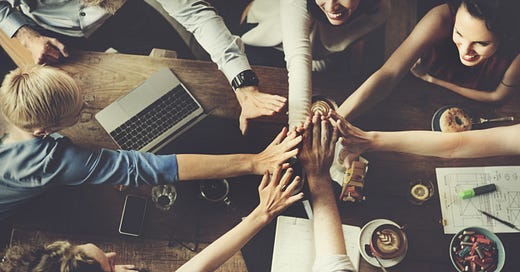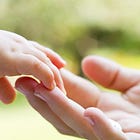Research Hit: Cooperation Increases with Group Size and We May Punish People Less than Previously Thought
New research adds more nuance to how human beings collaborate - but note that collaboration seems to be the default
You’ve written multiple times on the social brain what is new here?
Indeed just last week I reported on caring touch and collaboration in communities in all species of animal. I have also done a full review of the social brain previously, not to mention reported in multiple research hits on various aspects of the social brain.
This study out of Japan combined brain scanning with cooperation in larger groups. The results suggest is that as groups increase in size so does collaboration. Another separate study also looked into what is known as altruistic punishment.
So we do collaborate more in larger groups?
The working assumption is that as group size increases the need for collaboration may decrease, not to mention that some people may game the system.
The results of this study are a bit more nuanced. Zajkowski et al. of the Riken Institute got groups of people together and scanned their brains and put them through various collaborative exercises. The prisoner’s dilemma which is often used in research (choosing to snitch on a partner or not giving different outcomes depending on who does or doesn’t snitch) was used and group size changed and also using different group constellations.
This meant there were more possibilities and also that participants needed to remember who had snitched on them previously, or who they had snitched on.
And what were the results?
Well, it was interesting - the larger groups did tend to favour more cooperation. We as tribal creatures seem to favour and be more inclined to be cooperative in larger groups. It wasn’t a large effect size but clearly measurable.
Second it was noted that though memory did guide further decisions to cooperate i.e. remembering if you have a trustworthy companion.
However, when memory was unclear participants defaulted to cooperative mindsets (but this was partly dependent on personality). So cooperation is the default unless you clearly remember someone is untrustworthy or has snitched on your previously.
And in the brain?
They noted that two regions were associated with trust-based and cooperative decisions. These were regions in the prefrontal cortex (which we already know has social “centres”) and another regions called the nucleus accumbens (often related to reward and motivation).
Review of the social brain here:
And what about punishing antisocial behaviour?
Yes, this was another study I also noticed. We know there is a thing called altruistic punishment whereby we happily punish others that are antisocial even if it hasn’t affected us. Experiments do things like get participants to watch a card game when one participants cheats and the observer can then decide to punish the cheater with their own money. Most people decide to punish the cheater.
However, this research suggests that this might not be as common as assumed in everyday life.
How so - sounds logical - we all want the bad guys punished, right?
Yes, but this study also out of Japan by Kodai Mitsuishi and Yuta Kawamura added a little twist to this. They investigated different variations of unfair card games and how participants could punish perpetrators.
They wondered if there would be an effect whereby participants either avoided witnessing unfairness or also wanted to avoid the confrontation of punishing another.
So basically trying not to see negative stuff or avoiding approaching this - conflict avoidance?
Yes, and they found that yes, not one, but both strategies were used by participants. This means that though we may relate to this concept of altruistic punishment it is likely less common in society because of these effects of avoidance.
Is that good or bad?
It could be both - in experiments there is a clear perpetrator but in society our opinions of perpetrators are skewed by our biases or group identity - think politics. So maybe a good thing.
But personality influences this also as I reported on previously:
References:
Zajkowski, W., Badman, R.P., Haruno, M. et al.
A neurocognitive mechanism for increased cooperation during group formation.
Commun Psychol 2, 127 (2024).
https://doi.org/10.1038/s44271-024-00177-3
Kodai Mitsuishi, Yuta Kawamura.
Avoidance of altruistic punishment: Testing with a situation-selective third-party punishment game.
Journal of Experimental Social Psychology, 2025; 116: 104695
DOI: 10.1016/j.jesp.2024.104695







